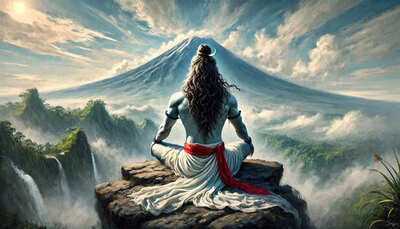
In Hindu mythology, the devas (gods) and asuras (demons) are often portrayed as eternal rivals locked in a cosmic battle of dharma and adharma, good and evil. But there is one divine figure both sides bow to without hesitation: Lord Shiva. Why would the gods and their enemies worship the same deity? What is it about Shiva that dissolves such deep-rooted oppositions? The answer lies not in ritual, but in Shiva’s very nature of fierce, detached, compassionate and unconcerned with labels. Shiva is the only deity who refuses to take sides, and that is exactly why both sides come to him.
1. Shiva: The God Beyond Duality

Lord Shiva isn’t just the deity of the devas he’s also revered by the asuras
Shiva is known as the Mahadeva, the great god. But what sets him apart is his complete detachment from the binary of good and evil. While Vishnu preserves and Brahma creates, Shiva destroys not out of anger or bias, but out of cosmic balance. In the Shiva Purana, it's said: Shiva does not see who is a deva or an asura. He sees only devotion. Whether you’re a celestial being or a fallen titan, if you call out to Shiva with pure intent, he responds.
2. Asuras Who Worshipped Shiva and Were Blessed

Lord Shiva isn’t just the deity of the devas he’s also revered by the asuras
Shiva’s generosity, or bhakta-vatsala nature, is legendary. Several asuras, though often considered anti-divine, found refuge and power through Shiva’s blessings:
Ravana, the powerful king of Lanka and a devoted Shaivite, once tried to lift Mount Kailash to show his strength. When crushed beneath it by Shiva, Ravana didn’t retaliate. Instead, he sang hymns in praise. Pleased, Shiva released him and even granted him the powerful Chandrahas sword.
Bhasmasura, another asura, performed intense tapasya (penance) to please Shiva. When Shiva appeared, Bhasmasura asked for a boon: that anything he touched would turn to ash. Despite the danger, Shiva granted it—true to his nature of honoring devotion, even at personal risk.
Andhaka, a demon blinded by arrogance, was also created from Shiva’s own sweat. When Andhaka realized his mistake and sought forgiveness, Shiva forgave and transformed him into one of his ganas (divine attendants).
Shiva does not discriminate. His compassion is frightening in its equality.
3. Gods Too Seek Shiva’s ShelterEven the devas, in times of crisis, turn to Shiva for strength and guidance. During the Samudra Manthan (churning of the cosmic ocean), when the deadly poison Halahala emerged, none of the gods could neutralize it. Shiva, without hesitation, drank the poison to save the world, his throat turning blue and earning him the name Neelkantha. In the Ramayana, even Lord Rama, an avatar of Vishnu, worships Shiva at Rameshwaram before crossing the ocean to Lanka—showing the mutual reverence among divine forces. Shiva’s transcendence over ego and power earns him the respect of both sides.
4. The Wild God Who Belongs to No One and Everyone

Lord Shiva isn’t just the deity of the devas he’s also revered by the asuras
Shiva lives not in grand palaces, but in the cremation ground. He wears no golden crown, only ash and dreadlocks. He dances on the edge of chaos and stillness, creation and destruction. He is not swayed by titles or rules. This very non-alignment makes him the ultimate force that both gods and demons trust. Because Shiva doesn’t serve an agenda—he serves truth.
5. The Inner Meaning: Shiva as the Supreme Consciousness

Lord Shiva isn’t just the deity of the devas he’s also revered by the asuras
On a deeper level, both devas and asuras represent qualities within us—our higher and lower tendencies. Shiva, then, is not just a god out there, but the consciousness within that allows both light and shadow to exist. He does not destroy evil to punish, but to transform. He grants boons to asuras not to empower darkness, but to test devotion, humility, and ego.
The God Who Doesn’t Choose Sides, But Transforms ThemShiva is not a god of rules. He is a god of realness. That’s why he appeals to sages and sinners alike. He sees devotion, not designation. He sees truth, not titles. In a world obsessed with judgment, Shiva is the one who listens without conditions. And that is why from asuras to gods, from Ravana to Rama—all bow to Shiva. Because when you stand before him, it’s not your name that matters. It’s your heart.
Unlock insightful tips and inspiration on personal growth, productivity, and well-being. Stay motivated and updated with the latest at My Life XP.
 In Hindu mythology, the devas (gods) and asuras (demons) are often portrayed as eternal rivals locked in a cosmic battle of dharma and adharma, good and evil. But there is one divine figure both sides bow to without hesitation: Lord Shiva. Why would the gods and their enemies worship the same deity? What is it about Shiva that dissolves such deep-rooted oppositions? The answer lies not in ritual, but in Shiva’s very nature of fierce, detached, compassionate and unconcerned with labels. Shiva is the only deity who refuses to take sides, and that is exactly why both sides come to him.
In Hindu mythology, the devas (gods) and asuras (demons) are often portrayed as eternal rivals locked in a cosmic battle of dharma and adharma, good and evil. But there is one divine figure both sides bow to without hesitation: Lord Shiva. Why would the gods and their enemies worship the same deity? What is it about Shiva that dissolves such deep-rooted oppositions? The answer lies not in ritual, but in Shiva’s very nature of fierce, detached, compassionate and unconcerned with labels. Shiva is the only deity who refuses to take sides, and that is exactly why both sides come to him.



